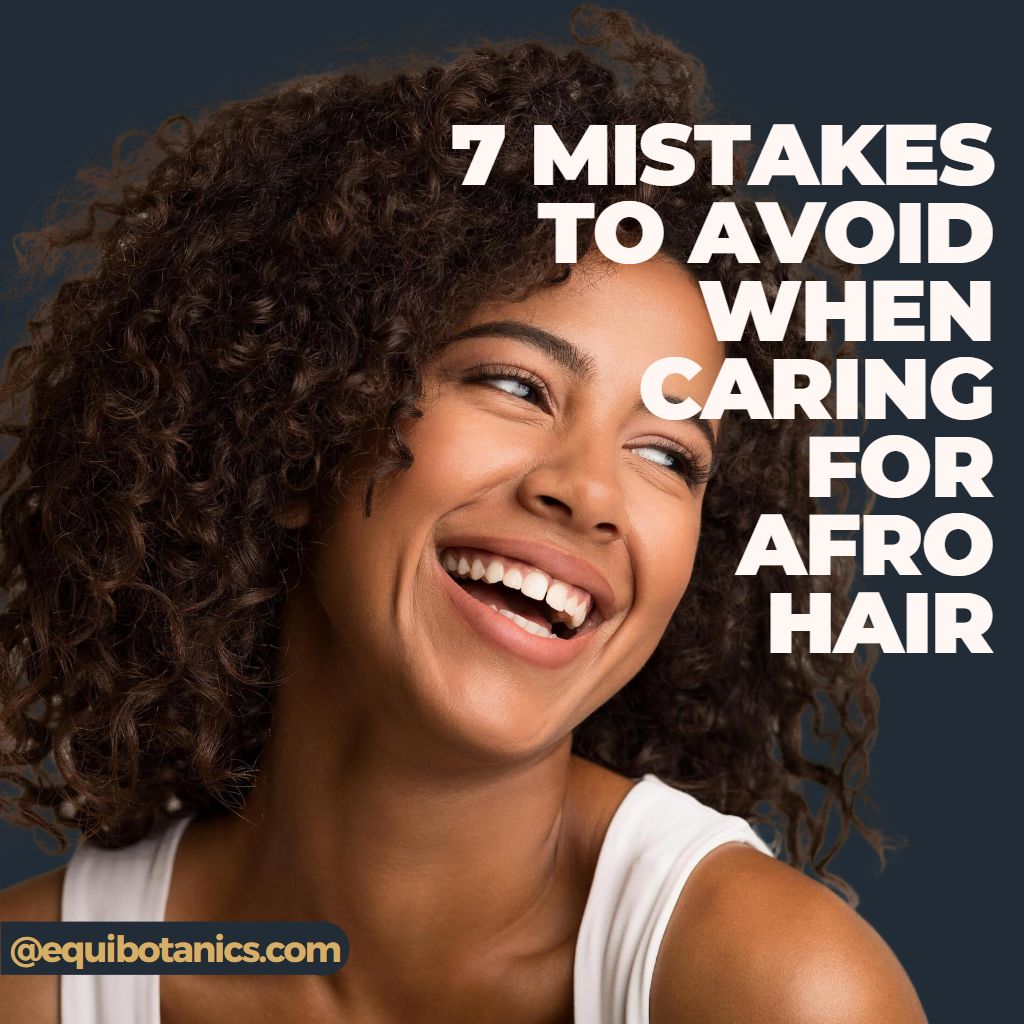
The unique nature of afro hair means it needs specific care to keep it healthy and looking at its best. It can be challenging when caring for this hair type, and there are some common mistakes that people make when looking after their afro locks. We’re here to help you avoid the mishaps, though, with 7 commonly made mistakes that people make when looking after afro tresses as well as what to do instead. Keep reading!
Key Summary
- Identify what your afro hair needs, from moisture to a fresh trim, so that you can take the best course of action for your locks.
- A lack of moisture, over washing, and too much heat are all common mistakes that people make when caring for their afro.
- Lowering the heat on styling tools, protecting hair with silk wraps, and using naturally-derived hair care will all help to maintain a healthy afro.
How to Identify What Your Afro Hair Needs
Before you create the perfect routine for your afro hair, it is important to spend time identifying what it is your hair needs, as your locks will be different to the needs of someone else’s. Pay attention to the texture, moisture levels and overall health. Take time to assess how it looks and feels on a daily basis. For example, does it feel dry and brittle? Does it look dull and lifeless? These could be signs that your hair needs more moisture.
Hair that lacks volume or feels oily could be as a result of product build-up, and if you’ve noticed more breakages, then it could be time to pop to the salon! Paying attention to your hair's needs and adjusting your routine accordingly are important factors in helping you keep your afro hair healthy and looking its best.
7 Mistakes for Afro Hair Care
1. Not Moisturising Enough

Afro hair needs a lot of moisture to stay healthy and prevent breakage. The tightly-coiled nature of this hair type makes it more difficult for the natural oils to travel down the shaft.
Try introducing a leave-in conditioner, such as the Marula Leave-In Hair Conditioner or hair oil into your routine. Don’t forget that hydration starts from within, so be sure to drink plenty of water throughout the day.
Marula Oil Leave in Conditioner
The Marula Oil Leave in Conditioner is jam-packed with natural high performing goodness, it can be used on its own without extra oils or butters. Say good-bye to the hassle of LOC or LCO method of conditioning. The Marula oil leave-in is a 3-in-1 as it works as a leave-in, is based on an oil and it’s a cream, saving you time and money.
You could also spritz hair with water throughout the day, or use a product such as the Rice Water & Green Tea Detangler. By gently misting this over your locks throughout the day, you’ll help to keep your hair nourished and prevent it drying out.
Rice Water and Green Tea Hair Tonic and Detangler
The Rice Water and Green Tea Hair tonic is jam-packed with natural, detangling and hydrating botanicals for refreshing hair daily. It is very effective on gym days when the hair is dried out from sweat so you can feel confident after a workout. The Rice Water and Green Tea hair tonic is also effective when used for detangling hair on wash days to save hours before applying the cleanser.
2. Over-Washing

Washing your hair too much can strip it of the natural oils which can lead to dry, brittle tresses. The great thing about afro hair is that, when it comes to how often you should wash your locks, once a week is usually sufficient.
Allocate a specific day every week to hair washing and this will give you the perfect balance between washing enough and not over washing, meaning you will avoid dryness and frizz. Follow our simple steps to hair wash success:
- Rinse hair through with warm, but not hot water. If your water is too hot, it can remove moisture.
- Apply a nourishing shampoo. We love the Baobab Hair Detangler & Cleanser as the natural formulation won’t strip the hair’s oils but helps to lock in moisture.
Baobab Hair Detangler & Cleanser
We prefer to avoid calling this a detangling shampoo. Instead, we call ours a detangling cleanser because it’s softening and moisturising while cleansing thoroughly. It also acts as your pre-poo detangler before you wash. Are you tired of that stripped feeling after you’ve just washed your hair? Wash your hair not strip it of its natural oils.
- Once you’ve rinsed out your shampoo, apply a conditioner. Leave-in conditioners are a great hair treatment for black natural hair, as they will protect your tresses and help to detangle them all whilst locking in moisture.
- Gently squeeze out excess water using a microfibre towel. Hair is at its most fragile when it is wet, so this will avoid damaged afro hair.
- Apply hair oil for a further dose of hydration.
3. Using the Wrong Products

There are a number of ingredients that don’t tend to agree with afro hair, and this hair type will definitely let you know if you aren’t using the right products! Sulphates, silicones and phthalates are just a few of the nasties that you should avoid when caring for afro hair as these harsh chemicals can strip the locks of moisture, leaving them dry and prone to breakages.
With such a vast array of products on the market, it can be a bit of a minefield trying to find the ones that work best for you but looking for afro hair care with naturally-derived formulations is ideal. Natural ingredients, such as shea butter, jojoba, and marula, mimic the sebum and fatty acids that our hair produces to help promote health.
4. Not Protecting Your Hair at Night

Afro hair is highly frizz prone, and this is likely to occur overnight because of the friction from hair rubbing against your pillowcase. Cotton pillowcases have rough fibres that can pull at hair as well as absorb moisture, which further dries your locks out.
Consider investing in a silk pillowcase as this will reduce friction and won’t absorb hair moisture. If you’d prefer to leave your pillowcases alone, you could consider wrapping your afro locks in a silk or satin scarf. The next morning, remove your scarf and scrunch a little bit of oil, such as the Black Seed Oil Hair Elixir, through your afro curls to refresh.
Black Seed Hair Oil Elixir
This Black Seed Oil For Hair is enriched with Fenugreek, Brahmi and Bhringaraj ayurvedic oils, our first hair serum is your best bet to reaching your hair goals. Stop split ends, check. Stop itchy scalp, check. Help accelerate growth, check check check. We've jam-packed this little bottle with luxurious ingredients from the Caribbean, India and the Amazonian rainforest to give you longer, thicker, and stronger hair in less time.
5. Heat Styling Too Often

We all know that too much heat can cause damage to hair. Using regular heated hair tools on your afro locks can lead to breakages, and leave hair looking (and feeling) like straw.
Embrace your natural afro and leave hair to air dry where possible, as well as saving the heated stylers for a special occasion.
If you do need to use hair tools, try using them on a lower heat setting and always apply a heat protectant to your locks. Using a deep conditioner or hair mask treatment for afro hair, such as the Babassu Oil Treatment Hair Mask, once a week will help inject much-needed hydration into heat-styled hair.
Babassu Oil Treatment Hair Masque
The Babassu Deep Treatment Hair Masque is an intensive protein-moisture balanced treatment that applies a restorative formula to the hair, using steam to encourage absorption into the hair shaft. It is jam-packed with Brazilian butter, Tucuma and Murumuru seed butters and revitalising oils to nourish your hair. It’s so rich and gets to work for longer, you only need to apply it once or twice a month.
6. Neglecting Your Scalp

It might sound obvious, but hair growth starts from the root. If you want to know how to care for your afro hair, then creating a clean, healthy base is the perfect foundation. In the process of restoring dry afro hair or encouraging growth, we often neglect the scalp and this common mistake could solve all your problems! Daily scalp massages will encourage blood flow to the area by promoting fresh circulation to the area.
Build-up is another common scalp issue which can be solved by using an apple cider vinegar rinse. Simply mix five parts water to one part vinegar into a spray bottle, spritz over the scalp and roots of hair, leave for no 3-5 minutes, and then rinse out. Finish with a conditioner to keep hair moisturised. A healthy scalp is essential for healthy hair growth. Make sure you keep your scalp clean and moisturised and consider using a scalp oil or serum to promote healthy hair growth.
7. Not Getting Regular Trims

If you’re growing your afro locks, getting a haircut might seem counterproductive but this definitely isn’t the case. Whilst getting a haircut might not grow hair any faster or longer, it certainly doesn’t damage your growth journey as, ultimately, hair will only grow during the anagen phase of growth which is determined by genetics anyway.
Regular trims help to keep your locks in tip-top condition, removing split ends that can cause breakages and therefore limit growth. Getting a fresh cut every 8-12 weeks will keep your ends free from tangles, maintain the shape and, most importantly, keep hair healthy!
Frequently Asked Questions (FAQs)
How Do I Maintain My Afro Hair?
When maintaining afro hair, it’s important to keep it clean by washing once a week. These tightly-coiled locks are prone to tangles so invest in a wide-toothed comb to detangle knots without pulling too harshly.
You’ll also want to keep heat exposure to a minimum to avoid dehydrating the hair; wear hats in the sun, use a hair SPF, and always apply heat protectant before using heat tools. Finally, hair oils and serums will be your best friend; regular application of these kinds of products will keep your locks moisturised, shiny and well-protected!
How Do You Keep Afro Hair from Frizzing?
To prevent your afro locks from becoming frizzy, avoid using harsh shampoos and instead use sulphate-free formulations. Other tips you could adopt include using a leave-in conditioner or applying a styling product that targets frizz and keeps it under control. Silk pillowcases and hair wraps will also help to keep frizz at bay.
How Often Should You Oil Afro Hair?
The frequency for applying oil to your afro hair will depend on your personal hair type and how dry it is. Generally, it's recommended to apply hair oil once or twice a week, but some people may need to oil their hair more frequently if it's very dry.
When oiling your hair, use a natural oil like black seed oil, coconut oil, or argan oil, and apply it to the ends of your hair first, working your way up to the roots to avoid your locks looking greasy.
Conclusion
Caring for afro hair can be challenging, but by avoiding these common mistakes, you can keep your hair healthy, strong and beautiful. Remember to moisturise regularly, use the right products, protect your hair at night, limit heat styling, take care of your scalp, and get regular trims. By caring for your afro hair and following these tips, you can ensure that your afro hair always looks and feels its best!


